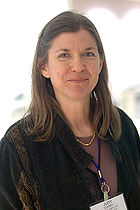
Judith Curry is a climate scientist who in recent times has achieved prominence in accusing her colleagues of groupthink, criticising the IPCC process, and suggesting that scientists can gain from more tolerant engagement with the sceptics. She is not a sceptic of the science herself, but unsurprisingly she has been welcomed by many of the deniers and is frequently quoted as evidence of the soundness of their complaints. Michael Lemonick of Climate Central has written a lengthy article about her published today in the Scientific American. He is even-handed to a fault, but I found nothing to alter my perception of what has struck me as her opacity and naivety in the few pieces of her writing I have seen.
Lemonick’s article raises the question of uncertainty in the scientific predictions, something which Curry apparently feels is not sufficiently acknowledged.
“Curry asserts that scientists haven’t adequately dealt with the uncertainty in their calculations and don’t even know with precision what’s arguably the most basic number in the field: the climate forcing from CO2—that is, the amount of warming a doubling of CO2 alone would cause without any amplifying or mitigating effects from melting ice, increased water vapor or any of a dozen other factors.”
I’m not a scientist. I’ve enjoyed reading science books for the general reader over the years and tried to have a broad understanding of major scientific theories. All relatively gentle and interesting. When it came to climate science however there was a dimension of urgency which was not present when reading about evolution or trying to understand relativity. If the climate scientists were even partially right the human future was under an almost unimaginably severe threat, though one which could yet be avoided. It rapidly became apparent that this was a science where one couldn’t just be an interested observer, even though a non-scientist.
In this context I can’t say it bothers me that scientists don’t know with precision the warming resulting from a doubling of CO2. I’ve seen the range that is generally considered possible and that’s quite sufficient to alarm me given that its effect is likely to be amplified by accompanying feedbacks. Apparently Curry feels that the uncertainty of the feedbacks is also not sufficiently acknowledged, but nothing I’ve read from the scientists offers certainty in estimating feedbacks, and what we are actually observing in the melting of Arctic sea ice or the acceleration of Greenland and Antarctic ice sheet loss is quite enough evidence for me that the feedback amplification effect is a serious factor.
Similarly it doesn’t bother me if the IPCC reports are judged to have not always communicated the level of uncertainty as carefully as they might have done. “Sometimes they do it well, sometimes not so well,” said Harold Shapiro, the head of the InterAcademy Council which recently reported on the IPCC procedures. That’s fine by me. I can cope with uneven performance. It doesn’t lead me to think that the overall scientific picture is unreliable. And even Curry acknowledges that uncertainty works both ways and can be overstated as well as understated. Again, observations that some effects of warming are occurring well ahead of expectations illustrates that.
It’s the broad sweep of climate science that rivets my attention as a concerned human being. Curry seems to me to be magnifying comparative trifles. Which is precisely what many of the deniers and delayers depend on. I doubt that she’s right in the matters she alights on, but even if she were it doesn’t alter the overwhelming reality of human-caused climate change. There’s a coherence to the scientific picture which we would be utterly foolish to allow ourselves to be blinded to even by a practising scientist.
Curry may have a gripe with her colleagues, but it is neither here nor there in terms of what the science means for the actions we should be taking. I notice she seems to be keen on cost-benefit analysis. I don’t know how you sit down and do that sort of analysis in the face of the threat of climate change. When disaster looms you do everything in your power to avert it.
[Brian Eno]
Like this:
Like Loading...



 It appears that the crank pantheon has a new hero:
It appears that the crank pantheon has a new hero: 